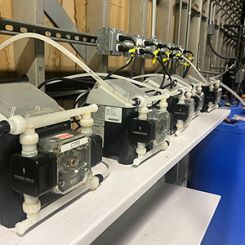A common threat to organic wastewater handling and treatment systems is the presence of hydrogen sulfide gas (H2S). This gas is toxic to humans and can be corrosive in pipes, structures, instrumentation and electrical systems. Sewage lift stations and pumping systems are particularly vulnerable as the H2S sour gas, which is produced during the decomposition of wastes, readily attacks copper used in wires, electrical contacts and cooling units used on pump panels and motor control centers (MCCs). Enclosure cooling is vital for MCCs containing the variable frequency drives (VFDs) that are used to maintain efficient operation through regulating pump speed. Because VFDs generate a considerable amount of heat, it is often necessary to use active enclosure cooling techniques to keep VFDs operating at acceptable temperatures. The absence of effective enclosure cooling will quickly allow VFDs to overheat, shut down or fail. Such outages disrupt production, risk damage to property, affect the environment with untreated waste discharge to waterways and upset the efficiency of plant operations.
 Image 1. Air-to-water heat exchangers retrofitted onto pump control panels at a wastewater treatment facility located in western Pennsylvania (Courtesy of Pfannenberg Inc.)
Image 1. Air-to-water heat exchangers retrofitted onto pump control panels at a wastewater treatment facility located in western Pennsylvania (Courtesy of Pfannenberg Inc.)
